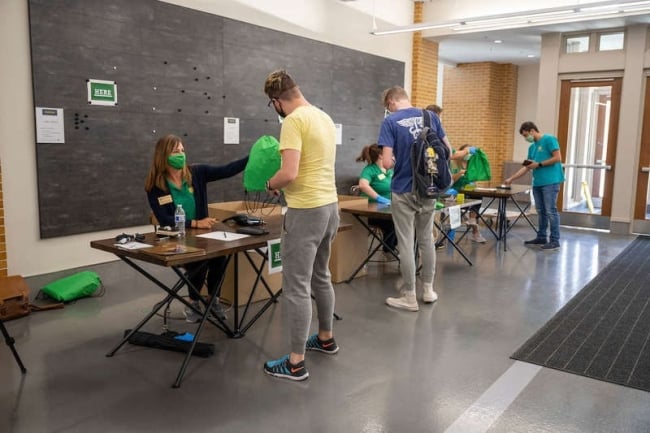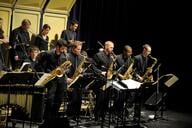You have /5 articles left.
Sign up for a free account or log in.

HERE ambassadors pass out welcome kits to students at Duncan Student Center.
Photo by Barbara Johnston/University of Notre Dame
Two more major research universities are walking back plans to resume in-person undergraduate instruction, continuing a rocky rollout for fall reopening efforts across higher education.
The University of Notre Dame announced Tuesday afternoon it was suspending in-person classes for almost 12,000 students, moving undergraduate classes to remote instruction for two weeks while keeping students on campus and giving leaders a chance to reassess plans and a rising coronavirus infection rate. The announcement came at virtually the same time Michigan State University asked undergraduates who had planned to live in residence halls to stay home and announced that it will transition classes planned for in-person instruction to remote formats.
The changes at Notre Dame come after the university started classes early this year, Aug. 10. Most returning students moved in from Aug. 6 to 9, with first-year students moving in a few days earlier. Since then, the university’s COVID-19 dashboard has shown a rising number of cases, with 147 confirmed cases since Aug. 3 out of a total of 927 tests performed.
“Upon receiving recent results, we began to make plans to send you home and continue instruction online, as we did last spring,” said Notre Dame’s president, the Reverend John I. Jenkins, in an announcement streamed online. “We have decided to take steps short of sending students home, at least for the time being, while protecting the health and safety of the campus community.”
Public spaces on campus will be closed, residence halls will be restricted to those living in them and off-campus students will be asked to not come to campus for the two-week period. In-person classes for graduate and professional students are suspended until Aug. 24 -- meaning that suspension is shorter by nine days than the suspension for undergraduates.
The goal is to tame the spread of the virus so that the university can resume in-person instruction. But if the steps aren’t successful, Notre Dame will send students home, Father Jenkins said.
Michigan State is in a different situation, as it had yet to hold move-in days for undergraduates. Its decision comes less than 10 days before students were slated to move back onto campus by appointment between Aug. 27 and Aug. 31. Both in-person and online instruction was scheduled to begin Sept. 2.
But Michigan State’s president, Dr. Samuel L. Stanley, had already started backing away from fall reopening plans. He sent an email to students and parents Aug. 3 saying, "If you can live safely and study successfully at home, we encourage you to consider that option for the fall semester," because most first-year students would have course schedules that are completely online.
Michigan State's Tuesday announcement came with some exceptions -- for graduate programs and those in certain other colleges. Research initiatives will also continue.
"Given the current status of the virus in our country -- particularly what we are seeing at other institutions as they re-populate their campus communities -- it has become evident to me that, despite our best efforts and strong planning, it is unlikely we can prevent widespread transmission of COVID-19 between students if our undergraduates return to campus," wrote Stanley, who is a physician and biomedical researcher.
The moves come the day after the University of North Carolina at Chapel Hill pulled the plug on in-person classes after just one week. Chapel Hill told undergraduate students to return home and be ready to complete classes online after a large number of students tested positive for COVID-19 infections last week and the campus’s testing positivity rate spiked to 13.6 percent.
As prominent research universities with big-name athletic programs, the trio of universities changing their fall plans at the start of the week drew widespread attention. But hundreds of colleges across the country have been reversing or altering reopening plans in the last several weeks amid the pandemic.
Earlier on Tuesday, Ithaca College in upstate New York said it would be continuing remote instruction through the fall semester. Its president, Shirley M. Collado, pointed to concerns over the pandemic, the potential for disturbing a relatively strong public health situation in the Ithaca area and the fact that students would have had a very different experience on campus than was normal.
“Finally, though none of us can predict the future with any certainty, it is easy to foresee the likelihood of a public health trajectory that would mandate the closure of the college due to circumstances beyond our control,” she wrote when announcing the changes. “Bringing students here, only to send them back home, would cause unnecessary disruption in the continuity of their academic experience.”
Remaining on Campus at Notre Dame, for Now
It’s unclear whether Notre Dame will be able to resume in-person instruction when the new suspension periods end. Father Jenkins said the move affected undergraduates for “at least” the next two weeks and left open the possibility of sending students home.
To support the decision, he pointed to the “advice and encouragement” of health officers in St. Joseph County, the Indiana county where Notre Dame is located. The university plans to enhance testing of those with and without symptoms. Father Jenkins expressed hope that such testing would catch cases early and contain the virus’s spread.
The steps are inconvenient, Father Jenkins acknowledged.
“They are necessary, however, if we are to continue our semester together on campus,” he said.
He went on to ask those who do not live on campus to remain in their off-campus homes and associate only with their housemates. A university limit on gathering size has been dropped from 20 to 10, with masks on and physically distanced.
Most infections are originating through off-campus gatherings, Father Jenkins said. Students infected at those gatherings have been passing it on, and then it has been passed on again.
Notre Dame has a policy that information gained through contact-tracing inquiries won’t be used in disciplinary actions. It will keep that policy in place so that students feel free to be honest.
But Father Jenkins promised to take action if the university gains information through other means about health standards being violated.
“If, however, we learn of a serious violation of our policies from other sources, we will take disciplinary action,” Father Jenkins said. “We have several reports that have been submitted and referred to the university conduct process.”
Depending on the situation, violations of standards “could jeopardize your presence in our campus community,” said Father Jenkins, who a week earlier apologized for stopping for photos with students on the quad that were not physically distant.
Research laboratories, core facilities and libraries are still open for graduate students, faculty members and staff members.
Notre Dame’s varsity athletic teams that undergo surveillance testing will still be able to gather for activities.
Father Jenkins has written publicly about the decision to bring students back to campus. In a May New York Times opinion piece, he acknowledged that the priority of protecting students’ health was in tension with the need to educate them and to do research. He called it a moral question.
“Indeed, the mark of a healthy society is its willingness to bear burdens and take risks for the education and well-being of its young. Also worthy of risk is the research that can enable us to deal with the challenges we do and will face,” Father Jenkins wrote. “We have availed ourselves of the best medical advice and scientific information available and are assiduously planning a reopening that will make the campus community as safe as possible. We believe the good of educating students and continuing vital research is very much worth the remaining risk.”
Michigan State Makes the Call Before Move-In
At Michigan State, the revised fall plans may have come before most students arrived on campus, but they come with their own share of logistical hurdles.
The university plans to work with international students on visa issues and with other students who need access to certain facilities in order to graduate. Students who need a safe place to live will be accommodated in residence halls.
Michigan State plans to issue refunds or credits for those who already paid for fall semester housing. It is urging those who live off campus to consider staying home if it is safer for them. And it is encouraging employees who can work from home to do so.
“We have seen that it is difficult for colleges and universities, and other areas of education such as K-12, to be open successfully right now given the prevalence of the virus,” Michigan State’s president, Stanley, wrote. “While I have faith in our students and all of the members of the campus community, we know that this virus is relentless and is easily spread. We’re seeing on our campus and in other areas of the country that a few mistakes by some are having large impacts on many.”
Financial ramifications will be felt. Earlier this summer, Michigan State leaders estimated a $300 million loss for the fiscal year because of the pandemic.
That leaves some employees worried about the future. But at least one union with members at Michigan State supported Tuesday’s decision.
“UNTF is concerned about our non-academic colleagues’ immediate job security and about the ongoing financial devastation that the pandemic has brought to higher ed, but we support this decision -- it’s the best decision for public health, and we’re happy that it was announced prior to move-in weekend,” said Kate Birdsall, assistant professor in the department of writing, rhetoric and American cultures and president of the Union of Non-Tenure-Track Faculty at Michigan State, in an email.




